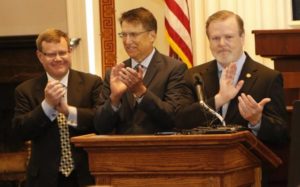by WorldTribune Staff, December 15, 2016
The tax-cutting regimen of Gov. Pat McCrory and the Republican-led North Carolina state legislature has led to $4.7 billion in tax cuts and landed the Tar Heel state in the No. 1 position in the nation for GDP growth since 2013.
From 2013 through 2015, North Carolina’s 13.4 percent GDP growth far exceeded the 9.9 percent average for both the Southeast and the nation as a whole.

“The result has been economic growth, job growth, and even additional tax revenue that could spur yet more tax cuts in the years ahead,” Akash Chougule, director of policy at Americans for Prosperity, wrote for National Review on Dec. 14.
Every working family in the state has seen their tax rates lowered, while the corporate tax rate is now the lowest in the country for states that still levy one, and the death tax was eliminated.
As a result, North Carolina’s business-tax climate has improved from 44th to 11th since 2013, according to the American Legislative Exchange Council.
On the jobs front, North Carolina’s labor-force growth in 2015 was five times larger than the national average. Nearly 295,000 jobs have been added since McCrory and the legislature made tax cuts a priority in 2013.
The unemployment rate — which was over 10 percent just five years ago — was cut to 4.9 percent as of October 2016.
“But North Carolina’s tax reforms haven’t just been good news for taxpayers and job-seekers,” Chougule wrote. “They’ve also created massive revenue surpluses, countering much of the rhetoric from opponents who claimed that tax cuts would blow a hole in the state budget.”
North Carolina finished the fiscal year that ended June 2015 with a $445 million surplus. Through the first six months of the 2016 budget year, the state took in over half a billion dollars more than it did in the same period the previous year, according to the State Controller’s Office.
The increased revenue “has also allowed the state to increase pay for public employees and bring average teacher pay over $50,000. North Carolina teachers’ pay has increased faster than that of any state in the country since the start of the 2014 school year, and is up almost $10,000 since 2013 — a more than 20 percent increase,” Chougule wrote.
“Best of all, the good news is far from over. In 2017, the top personal income-tax rate will automatically fall below 5.5 percent, and the corporate income-tax rate will fall to 3 percent. Under current law, the total tax cut on North Carolinians’ earnings will top $6 billion by 2020. The legislature wants to cut taxes even further this year by reducing the individual rate again or possibly by repealing the franchise tax, which would put more dollars back in the pockets of working families and further reduce the cost of doing business.
“In many ways, North Carolina has effectively showcased the ability of free-market reforms to create economic opportunity and prosperity. Principled lawmakers in the Tar Heel State plan to build on these successes in 2017 and beyond. Legislators elsewhere would be wise to follow their lead, too,” Chougule concluded.
